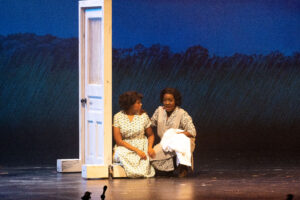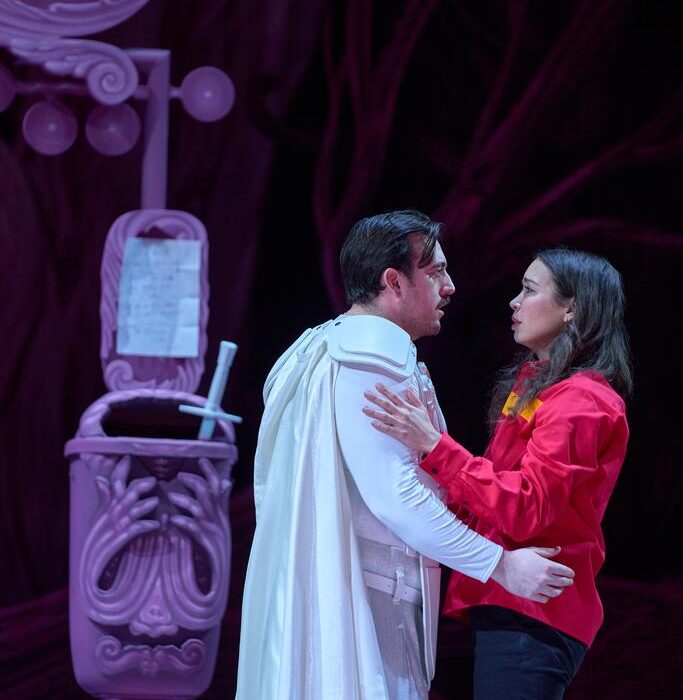
Virginia Opera 2024-25 Review: Loving v. Virginia
Damien Geter and Jessica Murphy Moo gift superlative ‘Loving v. Virginia’ for Virginia Opera’s golden anniversary
By Benjamin Torbert(Photo credit Dave Pearson Photography)
During the pandemic, Virginia Opera (VO) made plans to celebrate their fiftieth season, in 2024-25, exploring potential subjects for a commission. In recent talkbacks and receptions, Artistic Director Adam Turner emphasized that the company desired a Virginia-based story for this occasion. Ultimately they settled on that of Richard and Mildred Loving, the appellants in the landmark case before the United States Supreme Court, Loving v. Virginia (1967), which established the human right to marry unencumbered by state-level statutes prohibiting interracial unions. Loving nullified Virginia’s miscegenation code and would later provide basis for the expansion of marriage equality to same-sex couples as well, via the equal protection clause, per the Fourteenth Amendment, with Obergefell v. Hodges (2015).
For almost two years VO worked together with composer Damien Geter (a Virginia native), librettist Jessica Murphy Moo, director Denyce Graves-Montgomery, and principal singers to craft an opera that would both educate and delight audiences. The Richmond Symphony participated in a co-commission. “Loving v. Virginia” world-premiered in Norfolk on 25 April 2025, and continued for seven performances there as well as in Fairfax, and finally in Richmond. This latter city is about an hour south of Caroline County, VA, where the Lovings hailed from originally. Several great-grandchildren of the Lovings attended the 9 May performance and champagne toast, snapping pictures with the cast and creative team.
The opera is nothing short of a masterpiece. “Loving v. Virginia” will travel, and it should enter the North American operatic performance canon along with the finest 21st Century works, such as Jake Heggie’s “Dead Man Walking,” Rhiannon Giddens’ and Michael Abels’ “Omar,” and Terence Blanchard’s operas “Champion” and “Fire Shut Up in My Bones.”
Appropriately, the performance run concluded on Mothers’ Day 2025. While opera, particularly during its ‘long nineteenth century’ heyday, has intensely concerned itself with heteronormative romantic love, “Loving v. Virginia” expands this lens from the Lovings’ pair-bond to emphasize familial love, love of home, love of place, but most of all, maternal love. In building a robust chord of love, so to speak, maternal love forms the tonic note in “Loving v. Virginia.” Though deeply affecting throughout, the opera achieves its greatest artistic heights in its portrayal of Mildred Loving’s fierce protection of her three children, and of her relationship with her mother, Musiel Byrd Jeter.
Loving versus Virginia, so beautiful it’s a song
A plot summary does little justice to this opera but aids comprehension if you have not seen it. We should also not assume the entire audience arrived apprised of the basic facts. Conversations with people from many walks of American life alerted this reviewer to Loving v. Virginia’s lesser visibility in 2025 than other landmark cases such as, say, Brown v. Board of Education (1954). I had thought the 1967 decision just as famous, but an unscientific sample of various individuals asking what show came next on my docket resulted in many conversations explaining what “Loving v. Virginia” was about. Younger persons especially are often surprised to learn that interracial marriage became nationally legal a meager 58 years ago. One of the greatest lies perpetuated by opponents of Civil Rights is that not only has discrimination been confined to the past, but an ancient past largely unrelated to the present. Yet today there are Generation X children of interracial couples in the South, not even yet sixty years old, born prior to Loving.
Geter and Murphy Moo’s “Loving v. Virginia” purposes the facts of the case as a scaffold for the human story. The opera begins in 1967 with a temporal bookend depicting, in a stage-left/stage right ‘split screen,’ the Lovings rising for the day in Virginia while Bernard Cohen and Philip Hirschkop meet to present final arguments for the case before SCOTUS. The action then jumps back to 1958 as Mildred and Richard, in their youth, flirt at a country racetrack where Richard and his friend Raymond prepare a stock car for competition. Mildred’s cousin Annette expresses a desire to escape rural Caroline County and warns Mildred not to ‘let love take you down a hard road.’ Act One takes us through their courtship, Richard’s audience with Mildred’s parents Jake and Musiel, asking permission to marry her, and their return from Washington DC with their legally obtained marriage license, invalid in Virginia. The racist county sheriff raids their bedroom in the small hours, arrests them, and takes them to the county lock-up where the most extraordinary and effective scene in the opera takes place. This is a visit from Mildred’s parents, in which Musiel sings a lullaby to her incarcerated daughter. In the final scene of Act One, the Lovings plead guilty to miscegenation, punishable under the Virginia code by one to five years’ imprisonment, though the judge ‘generously’ issues a suspended sentence whereby they may remain together and out of jail, but only if they leave Virginia for twenty-five years.
Act Two commences in the early 1960s during the Lovings’ exile in DC, interspersed with a few signposts of Civil Rights history such as Dr. King’s 1963 march on Washington. Mildred writes to Attorney General Robert Kennedy, and then the American Civil Liberties Union, securing assistance from Cohen and Hirschkop. Mildred and Richard and their three children return surreptitiously to Caroline County as Cohen and Hirschkop litigate the case all the way to SCOTUS. In a climactic scene, unseen assailants burn a cross in the family’s yard when they say dinnertime grace, while the lawyers appear before SCOTUS. The opera ends with a triumphant reading of the unanimous decision voiding the Virginia code, and Mildred and Richard returning to the pastoral setting of Caroline County.
A summary communicates little of the wholly integrated drama of Geter’s score and Murphy Moo’s superbly crafted libretto. Every scene arrives rich with musical detail, textual detail, and detail in staging and interaction between the singers, revealing deep consideration of each choice by the creative team. “Loving v. Virginia” simultaneously succeeds on multiple fronts. Well served is Sir Philip Sidney’s dual raison d’être for creative art as laid out in “An Apology for Poetry” — to teach and delight. But the opera also honors its real-life subjects, who wished to live and love and raise a family at home and in peace. It repeatedly connects its drama to the challenges to human dignity and Civil Rights waged by a reactionary government in 2025, without exhibiting wires in so doing. The opera delivers many ‘oof’ moments for present-day viewers inclined to recognize parallels, while refraining from landing any particular moment too squarely upon the nose. Sunday matinee attendance saw more Black women of a certain age, some of whom took a refreshingly interactive approach to receiving some of the heaviest moments in the drama.
I’ll build it with my own two hands
At talkbacks Turner disclosed that the production cost VO about $1.4M, some of which a reneged-upon National Endowment for the Arts grant was supposed to have provided. Intelligently, most of this money appeared to be invested in human resources. The staging was perfectly scaled: broad enough to engage the eye but frugal enough to prioritize what mattered most, employing the creatives, the musicians, and the support staff. It might scale up at Minnesota Opera — the opera’s co-producers — or at a larger house later. As it was, it ported smoothly to each of the three venues: both the more suitable Harrison Opera House in Norfolk and Fox Theatre-esque Dominion Energy Center in Richmond, as well as the somewhat dismal auditorium at George Mason University’s Hylton Performing Arts Center.
The singers themselves acted as stagehands, seamlessly moving props and modest sets, designed by Mikiko Suzuki MacAdams, on and off throughout the two acts’ nineteen scenes. Bleachers backing Act One’s car race were later repurposed as steps for SCOTUS, or risers for judges to sit upon. Mildred and Richard’s country house, as well as her parents’ home, consisted of little more than a front door, a dinner table, a few chairs, a bed, and a nightstand. The spare sets physicalized Mildred and Richard’s lack of protection in the world. In DC, their apartment worked similarly, although Scene One’s comparatively larger set managed to communicate the larger scale of Washington DC, where Richard and his colleagues laid bricks.
If you run a show on such a lean set, lighting and projections become more important. In the best visual choice, from 1958 to the finale, a field and blue sky backed the rural Caroline County scenes. The calibration of sky-to-earth ratio, which leaned towards sky, and the gold color of the grass during daylight, made Loving country look like a more hopeful version of Andrew Wyeth’s “Christina’s World.” The field turned blue at night. Projections also made for a grubby, busy urban backdrop of DC with the Capitol Dome in the distance. Lighting design by Xavier Pierce and Madeleine Reid impressed the most in the jailhouse scene, where a gobo threw striated light at weird angles upon Flora Hawk, creating the sensation of a Dutch tilt in a film noir, despite the human subjects occupying a level stage.
Jessica Jahn’s costumes achieved everything needed, most principals and choristers looking appropriately like working-class characters on “Mad Men.” Hawk received about half a dozen changes of kit as Mildred, usually in dresses, as well as an innocently sexy white nightgown for her terrifying trip to the county jail. Her wardrobe contrasted nicely with her cousin Annette; the taller Tesia Kwarteng rocked smart slacks, signaling her independence. The men wore an array of flannel shirts and jeans and work clothes, except for the suited Troy Cook and Christian Sanders as the lawyers, and Benjamin Werley in the dual roles of Sheriff Brooks and Judge Bazile. Elyse Messick’s wigs worked well, especially an afro for Philip Bullock’s Jake Byrd, and Werley’s slick dark hair and glasses that made him look eerily like a later SCOTUS member, Antonin Scalia. In a broad but weirdly effective gesture, one chorister wore a T-shirt printed with the year in which a given scene took place. Though subsequent stagings of this opera at larger companies may receive more resources, VO nailed it with the budget they had.
We decide who you are. We decide who you love
Graves’ key directorial conceit assigned eight black-masked choristers various dramatic jobs, but especially that of personifying the law, and its failure to deliver equal protection to all Americans. This Law Chorus functioned variably as the law itself, as the eight associate justices of the Supreme Court, and in the show’s finest coup de theatre, a writhing human ring forming Mildred’s jail cell, beneath a single swinging drop light. Hawk’s anguished ‘I can’t breathe’ in lockup recalled, of course, George Floyd’s words as policeman Derek Chauvin murdered him in May 2020. No quantity of cinderblocks rolled onto the stage could have made a more menacing barrier between Musiel Byrd Jeter and her daughter than that lonesome droplight quietly circling above Mildred in the soft breath of the theater’s air conditioning. The palpable claustrophobia felt hot in Mildred’s music as she noted the heat rising and cicadas that ‘electrify the air.’
A worm in the ear is a joy forever, and one of the Law Chorus’ best moments was in Act One Scene Five, in which they and the fuller chorus vetted Mildred’s DC-based application for a marriage license, back in Bowling Green, VA. In a musical number that worked sort of like a concertato, if you squint at it, their snappy repetition of ‘know the code, know the code, do your job,’ as an entire office pool at the courthouse worked their way through Mildred’s lineage and her choice to put ‘Indian’ in the field for race, culminated in a shattering choral stomp delivering the decision ‘against the code.’ The Law Chorus offered an evaluative topper, ‘We decide who you are. We decide who you love.’ Werley’s judge traipsed downstage, delivering in an unhinged, nearly-enraged tone, ‘against the peace and dignity of the Commonwealth!’ Despite the Commonwealth’s fetish for Pocahontas and some accompanying case law, Mildred’s partial native ancestry proved insufficient armor against one-drop logic deeming her ‘Negro.’ Maestro Adam Turner directed all this musical traffic masterfully: principals, chorus, and 52-musician orchestra alike.
Graves’ staging succeeded in every single moment of the opera’s two-hour runtime by investing in such specifics. A continuous network of just-right movements, gestures, blocking, and other staging details appeared with such density that repeated viewings of the opera invited the eye to notice different moments, or to relish the reappearance of a favorite from a previous performance.
Too many such theatrical jewels occurred to recount in this article. Among them, Jonathan Michie and Tesia Kwarteng’s dap-adjacent greeting to each other at the kitchen table in DC, as Richard and Annette, did as much to underline Richard’s invited-to-the-cookout status with his Black in-laws as any moment in the whole show. Richard’s male privilege never looked so clear as when Mildred juggled both keeping their children in line at the ACLU office and speaking with Cohen and Hirschkop, while Richard had to do only the latter. Likewise, Richard’s white privilege emerged in his slightly defiant stance with Sheriff Brooks in the jailhouse scene. Theoliver “Jake” Byrd, played by Phillip Bullock, instead had to back down silently from a nightstick poke in the sternum when Brooks left his house with his arrested daughter, while Bullock’s face communicated four centuries of having to take this sort of crap with grace. The pitch perfect stage direction continued to the last note, Flora Hawk’s adorable little hop preceding her embrace of Michie at curtain.
I want this baby born in Virginia
During rehearsals at an early-April panel with Turner, Troy Cook, and the ubiquitous scholar Dr. Naomi André, Denyce Graves stressed repeatedly the Lovings’ — and especially Mildred’s — lack of desire to make history. ‘They didn’t really realize the severity of what it was that they had done. They were just two young people who fell in love with each other, and again, that kind of union was supported in the environment where they were. They were not unusual. There were other people who were in interracial relationships or mixing at that time, but they were the ones who were chosen.’
The opera takes that view of Richard and twice so of Mildred. In her VO mainstage debut, soprano Flora Hawk gave consistently captivating and affecting performances as Mildred Loving, her portrayal deepening from Norfolk to Fairfax and finally to Richmond. Hawk sang with enough chest voice to get by in brief low passages, and a bright, delicious, pinky top the hue of strawberry Yoo-Hoo. The score played to her strengths. Indeed, Geter appears to comprehend what audiences want, as Hawk received three musical passages that we can term ‘arias.’ In operatic circles forty years ago it was de rigueur to pillory Debussy’s “Pelléas et Mélisande” as dark, impenetrable, and devoid of song outside of a minute’s worth of the heroine’s brief diegetic self-accompaniment to combing her hair. But, after another four decades of contemporary opera, so thoroughly has Debussy’s through-composed dialogic approach won over the art form that it is sometimes difficult to imagine composers doing anything less than that. Most operas now, no matter the musical language employed, conduct themselves like “Pelléas et Mélisande,” or like Michel Legrand’s “The Umbrellas of Cherbourg,” a quilt of near-recitative stretching to the final curtain.
What a treat then, that “Loving v. Virginia” contains three arias — or at least ariosi — for the lead soprano, and another for her mother Musiel, and another for her lawyer Bernard Cohen. Hawk’s most emotionally impactful scene took place in the jailhouse (‘Daddy was right. Mama was Right. Trouble Came.’), with a monologue that acted sort of like an art song. The orchestral accompaniment came with cues that reminded of Elmer Bernstein’s music for Elia Kazan’s films. Hawk used some strong chest voice with ‘the walls bear down.’ Her starkest utterance in the jail cell, ‘my God / you are a silent God’ seemed to transcend her punctual distress.
Hawk’s great moment in the second act took place back at home, at Christmas, with the ‘Oh Sweet Peggy’ aria, replete with striking timbral beauty. Introduced by Geter’s creative orchestration, banjo and fiddle onstage, guitar, xylophone, and by Musiel’s evaluation that ‘she’s perfect,’ in addressing her baby, Hawk meditated on locality, safety, heredity, and race. ‘I’ve heard it all before. / Not white enough for this. / Not Black enough for that. / Not Indian enough / for everything in between.’ But, she told her daughter, ‘you are always enough / Sweet Peggy.’ Hawk proved the perfect casting to create this role.
Peggy Loving yet lives, alone among Mildred Loving’s children, her two brothers having died.
It’s time to shake free of these country roads
Such a delight was Tesia Kwarteng’s performance of the comprimario role of Annette Byrd. Kwarteng made the most of a modest allotment of lines, mainly in two scenes. The first is at the racetrack in Act One and the second is in Act Two at Mildred’s kitchen table in DC. If you are from rural America, and you leave for the ‘urbs,’ or you leave and return, it is tempting to try to game the psychological makeup of categories of rural and small-town residents: those who stay forever, those who leave briefly but soon return, those who leave for a long time but eventually return, and the people who leave forever, perhaps parachuting in for winter holidays and funerals. Why does a given person choose which path? Annette’s self-assured desire to leave and her abundant excitement in the events of 1963 in Washington DC both recalled this mystery and threw into relief Mildred’s homing instinct and her view of America’s capital as a temporary solution to her family’s persecution. Annette framed her wanderlust not in terms of greater racial discrimination in Virginia, but standard-issue youthful longing for urban excitement. The statuesque Kwarteng projected such confidence, and as the more worldly character, her robust, sort of burgundy-colored mezzo-soprano contrasted nicely with Hawk’s sweeter sound.
Forevermore you’ll be a mother worried about her child
The über-versatile mezzo-soprano Melody Wilson gave a commanding performance as Musiel Byrd Jeter, a low soprano role the composer blessed with the most powerful five minutes in the entire score. A natural zwischenfach, Wilson has sung roles ranging from the basically-contralto Olga in “Eugene Onegin” and Addie in “Regina,” to higher mezzo fare such as Fenena in “Nabucco” and Amneris in “Aida.” This versatility served her well for Musiel, a role originally intended for soprano Karen Slack early on in the creative process.
Musiel appears in several scenes, always in Virginia, but the jailhouse episode, Act One Scene Seven, forms the emotional fulcrum of the entire opera. Musiel and Jake arrive at Mildred’s cell, but cannot see her, and only Musiel addresses Mildred as she reports that Jake is ‘here…but he’s lost his voice’ as Jake weeps upon hearing Mildred speak. Musiel assures Mildred ‘we’re working on your bail,’ but the recitative is followed by a lullaby, in 6/8 time, key of C-minor, with the whippoorwill call that Musiel names made by the flutes. She tells her daughter to lie down in the cell and sings her to sleep. Mildred hasn’t yet told Richard that she’s pregnant, but Musiel knows, telling her daughter ‘you must rest / my child / so you have reserves / for tomorrow and tomorrow and tomorrow.’ The opera’s maternal through-line forms the basis for Mildred’s perseverance from 1959 to 1967.
Wilson’s timbre, a breathing ruby, warmed the room as the Law Chorus stopped writhing halfway through the lullaby, while the orchestra rocked beneath her. Her delicate dynamic contrasts created the sense of the addressee’s nervous system regulating. She ended with a weightless pianissimo D♮ on ‘pain,’ the last word of the aria, in ‘wondering / always wondering / if there was something / anything you could have done / to spare her pain.’ After this contemplation, and prayer, Wilson fell to her knees. Richard and the other men are necessary to the story, but “Loving v. Virginia” is anchored by the two mothers in this scene, a foundation that underlines the entire opera.
Richard’s mother, Lola Allen Loving, has a shorter role, her lines mostly confined to the following scene, in which Richard receives the summons to court. Elyse Messick’s make-up design plausibly aged up both mezzo-soprano Alissa Anderson and Wilson. Anderson’s rich voice gave a matronly affect in counseling her son, offering him philosophical depth in her handful of lines. As Richard panics and rages, Lola offers that ‘all my years as a midwife / have taught me / we’re all born the same way / we all die when it’s our time.’ And while Lola hugs the arriving Mildred at the end of the scene, her advice to Richard just prior sounds curiously open-ended, ‘You will have to make a choice / between the person / and the home you love. / If I’ve raised you right / you’ll know what to do.’ Richard chooses Mildred and later complains of an ill fit with home upon returning to Caroline County in Act Two.
Never met a surprise I was happy to meet
As Theoliver “Jake” Jeter, baritone Phillip Bullock skillfully used his brawny sound to communicate a no-nonsense outlook about the realities of midcentury life for African Americans. The opera introduces him by way of a deeply satisfying ensemble for Jake and Richard on one side of the Jeters’ front door, and Musiel and Mildred inside. It is an intricately-written piece reminiscent of the landmark quartet of all opera, Verdi’s ‘Bella figlia dell’amore’ from Act Three of “Rigoletto.” Richard approaches him to ask for Mildred’s hand in marriage, but despite a lightly comic, rom-com-esque note, the quartet flowers into a concise exploration of Richard’s white privilege and Jake’s family’s corresponding lack. Over the course of the quartet, Jake travels from ‘my answer is no’ to ‘I’m coming with you to DC,’ while the women eavesdrop and interject, Musiel agreeing with his observations on race. Geter introduces a staccato motive associated with trouble which resurfaces later as law enforcement stalk Mildred and Richard, and when the cross-burners attack the Jeter homestead. This motive employs Morse code for the word ‘trouble,’ a maneuver that recalls Barrington Pheloung’s mournful theme music for the “Inspector Morse” television series. Handling a tobacco pipe naturally and gesturing with it for accent, Bullock educated Jonathan Michie’s Richard about privilege, and even, indirectly, W.E.B. Dubois’ concept of double consciousness, ‘There are things you don’t know. / Things you don’t see…We see things / white folk don’t see.’ This quartet stands as one of the finest achievements in the work by Geter and Murphy Moo, and it reinforces what opera lovers already know intimately: that the art form, more than any other, interweaves complex emotions, ideas, and lived realities for several characters in ways that short stories, novels, stage plays, films, and television cannot do.
Most of Jake’s talking unfolds in that scene. In other scenes, his character reverts to strong and silent, foregrounding his wife and daughter in support of the opera’s maternal through-line. But even when silent, Bullock impressed, weathering the sheriff’s insults, and voicelessly slamming Mildred’s vacated bedframe on the floor after her arrest and departure.
You know I won’t have the right words. I never do
Baritone Jonathan Michie’s portrayals of Richard, like Flora Hawk’s performances, grew and deepened over the course of the three-city run. His voice sounded more robust in Richmond than previously, with a sort of graphite-colored, slightly Broadway-adjacent sound. Seeming a bit tentative at first in Norfolk, his emotional moments (‘I am an oil fire’) punched harder in Fairfax and Richmond. A body of historiography on the Lovings has informed us that Mildred initially blanched at Richard’s arrogance, but her affection grew over time. The opera’s version of him creates a tension between his self-conception as a man of few words, like his father-in-law, and a guy who actually does talk a lot. His friend Raymond Green, affably played by baritone Adam Richardson, agreed with Richard’s self-imaging, remarking during one of the Lovings’ surreptitious returns from Washington, ‘I’ve known you more than thirty years / I’ve never heard you say that many words.’ Richardson ably balanced humor with support for his friend.
Michie’s finest moments came in scenes depicting tenderness towards his wife. He also displayed great emotional intelligence — most of the time — in handling her anxiety and homesickness. Like her, he strained against their urban setting in the capital, noting that he feels less purposeful bricklaying there. Less explored was a nearly throw-away musing later in the second act, ‘I used to belong here / no more,’ back in Virginia. But overall, both Michie and the creatives did a good job of foregrounding Mildred and her kin in the story. And plaudits should go to Geter for making Richard a baritone—we have heard enough soprano/tenor meet-cutes to fill four centuries of opera.
Lawyers, slowest creatures known to man
As Bernard Cohen and Philip Hirschkop—the latter in attendance at a Fairfax performance—veteran baritone Troy Cook and tenor Christian Sanders complemented each other well. Their sense of the history being made vibrated in each of their scenes, unlike the Lovings who just wanted to live simply and happily. Cook got a whole arioso (‘Their name is Loving? That can’t be’) where he discloses in an aside his early-career feeling of ill preparation for such a momentous duty. Cook’s warm but baritenor-esque timbre gave an apt lightness to his musings about the Lovings’ too-literary surname, and cleansed the slight self-satisfaction his character felt at the social importance of the case. Sanders’ Hirschkop, however, radiated glee at their potential place in history with a more frenetic energy and a nearly bel canto, tenore di grazia sound. His youthful excitement at their being targeted by haters — ‘Look, we’re famous. / The KKK paper is calling us ‘the two Jew lawyers,’’ this delivered sunnily — contrasted with Cook’s more careful outlook. In an amusing micro-argument in their office in front of the Lovings, they disputed whether to begin their case with equal protection, or with due process. ‘You disagree / on A to B,’ observes Richard. Both men evinced genuine concern for improving the Lovings’ state.
Tenor Benjamin Werley played the oppressive side of the law, divided into two roles: Sheriff Brooks, who raids the Lovings’ bedroom at 2:00am after considering aloud what would be the meanest way to hassle them, and Judge Bazile, who presides over the Caroline County court. As the judge, his pronouncements came in high tessitura, with a securely produced but intentionally unpleasant, abrasive tone, especially the greasy business about ‘the peace and dignity of the Commonwealth.’ Geter’s choice to make the villain(s) a tenor and the male protagonist a baritone worked well. And Werley mustered the right sort of menace for the sheriff, a petty man who wouldn’t scare anyone were he not licensed to carry a gun and a night stick. His showdown with Bullock’s Jake proved which character was the lesser man. To play characters like those without too much cartoonish mustache-twirling is difficult, but Werley succeeded.
Nostos
Geter’s finest achievement in leitmotif stretches from the opera’s beginning to end, the ‘Home’ motif, a warm bluegrass theme first introduced by an acoustic guitar. ‘Home’ migrates all over the orchestra pit but returns most often in the strings, and encodes not only the Lovings’ natural setting, but also Mildred’s homesickness. And it is just gorgeous, as is much of the score. Turner and the Richmond Symphony played beautifully throughout the run.
One of the oldest stories, and the subject of recent translations of Homer’s “Odyssey” by Emily Wilson and Daniel Mendelsohn, is that of the protagonist’s return home. “Loving v. Virginia” delivers the victorious almost-ending with the announcement of their win at the Supreme Court, as reporters ask Mildred the sports-cliché question, ‘How does it feel?’ She replies, ‘I feel free.’ But the opera saves the true finale for Mildred and Richard, alone, in silhouette, facing their Wyethian back forty in Caroline County, accompanied by the ‘Home’ motif.
But this return was not preordained and it required many years and great effort and perseverance by the Lovings and their families, and the patient work of their legal counsel. We cannot assume gains in human rights will last permanently. In the current issue (29 May) of “The New York Review of Books,” America’s foremost commentator on SCOTUS, Linda Greenhouse, reviews Michelle Adams’ book “The Containment: Detroit, The Supreme Court, and the Battle for Racial Justice in the North.” Greenhouse’s essay, aptly titled “How Brown Came North and Failed,” outlines how President Richard Nixon’s SCOTUS appointees undercut Brown with Milliken v. Bradley (1972), leading to today’s public school integration landscape, in which American schools have drastically re-segregated by race. In his opinion, in Dobbs v. Jackson Women’s Health Organization (2022), which overturned Roe v. Wade (1973) and returned law-making about abortion access to the states, Associate Justice Clarence Thomas threatened to revisit other decided cases involving human rights. In the span of its timeframe, Geter and Murphy Moo’s opera tells a beautiful and triumphant story about Richard and Mildred Loving and their family. But as the 58th “Loving Day” occurs this 12 June, we cannot assume that the end of this opera shows the end of the story about the right to marry without regard to race. Geter and Murphy Moo have gifted us a masterwork, one of sharp relevance to America’s political environment in the year of its premiere, but crafted to endure. Let us hear this opera beyond the Commonwealth of Virginia, again and again.



